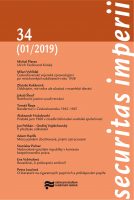Odcházím, mé srdce ale zůstává v mateřské diecézi. Perzekuce německého katolického kléru v litoměřické diecézi po 2. světové válce
I Am Leaving But My Heart Stays in My Mother Diocese. Persecution of German Catholic Clergy in the Litoměřice Diocese after World War II
Author(s): Zlatuše KukánováSubject(s): WW II and following years (1940 - 1949)
Published by: Ústav pro studium totalitních režimů
Keywords: ecclesiastic history; Czechoslovakia; 20th century; Roman Catholic Church; Litoměřice diocese; religious persecution; eviction of German clergymen after 1945
Summary/Abstract: The study focuses on the eviction and persecution of Roman Catholic clergymen of German ethnicity in the Litoměřice diocese during the first wave of uncontrolled massive transfer following World War II. It is based on a list of missing, interned, evicted and otherwise persecuted Roman Catholic clergymen, compiled by the newly appointed Czech Vicar General Josef Kuška in the summer of 1945 based on the correspondence and various reports sent to Litoměřice. The list contains over 60 names of parsons, administrators, chaplains, religion teachers, catechists and other clergymen. The author cites examples of clergymen deployed on labour (mitigating war damage or harvesting crops in farms) who were held in detention for months. Most of them were later released without a court procedure because their detention was often groundless and there was no evidence for proper complaints to be lodged. The study focuses on the various forms of persecution of the clergymen and on the church’s attempts at preventing experienced German clergymen from leaving for Saxony, Bavaria, Rhineland and other regions of Germany and Austria. Some clergymen were evicted and transported across the border without being given the time to pack for the trip or hand their parishes and offices over to their successors or authorities. The exodus of Roman Catholic clergymen from the borderland part of the diocese caused many problems, personnel turnover and expansion of benefices, which made conducting masses and securing the vital statistics agenda more difficult. Parsons’ arrests were often followed by destruction and theft of both church and private property. Parish houses were often used as lodging for the army or confiscated for other purposes; some were even used for storing crops and farming production.
Journal: Securitas imperii
- Issue Year: 2019
- Issue No: 34
- Page Range: 62-98
- Page Count: 37
- Language: Czech

